|
|
|
Sort Order |
|
|
|
Items / Page
|
|
|
|
|
|
|
| Srl | Item |
| 1 |
ID:
065949
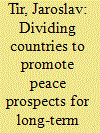

|
|
|
| 2 |
ID:
083747
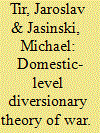

|
|
|
|
|
| Publication |
2008.
|
| Summary/Abstract |
According to the diversionary war theory, problematic domestic circumstances motivate a country's leader to divert popular discontent by launching a militarized international crisis. Yet, empirical support for this argument has proved to be ambiguous at best. Relying on extant ethnic conflict research, we argue that the embattled leader can elicit public support by using armed force against ethnic minorities within his/her country. We call this option domestic diversion and argue that it is not only available to a larger number of leaders, but that it also often presents a less risky course of action than external diversion. Empirical tests of the domestic diversionary hypothesis show a connection between domestic problems facing the leader and the use of force against minorities. This finding provides a potentially new interpretation for the causes of some domestic conflicts, and suggests that the diversionary theory may operate on the domestic level of analysis.
|
|
|
|
|
|
|
|
|
|
|
|
|
|
|
|
| 3 |
ID:
107925
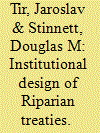

|
|
|
|
|
| Publication |
2011.
|
| Summary/Abstract |
International agreements governing rivers vary considerably in whether they contain institutional provisions for joint monitoring, conflict resolution, enforcement, and/or the delegation of authority to intergovernmental organizations. This article develops an explanation for why some river management treaties include more institutional provisions while others contain fewer, if any. The authors argue that certain types of issues related to river use-water quantity, water quality, and navigation-tend to be difficult to manage and prone to noncompliance. When forming treaties to address these specific issues, states will be more likely to include institutional provisions. The authors test the link between these river use issues and institutional design using a data set of 315 river treaties signed since 1950. The results show that highly contentious issues-and in particular water quantity and navigation-have a greater effect on the institutional design of river treaties than contextual and power politics factors.
|
|
|
|
|
|
|
|
|
|
|
|
|
|
|
|
| 4 |
ID:
088928
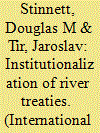

|
|
|
|
|
| Publication |
2009.
|
| Summary/Abstract |
This article seeks to expand our understanding of why states use international institutions to manage transboundary rivers. Agreements governing the use and management of international rivers can contain a variety of different institutional features. We address the question of why riparian states choose to include or exclude these features from river treaties. Our explanation focuses on the problem of securing post-agreement compliance. Institutions perform a variety of functions that help states maintain cooperation over time. We analyze this explanation using a data set of river treaties formed between 1950 and 2002. We find that the institutionalization of river treaties is associated with water scarcity, the flow pattern of shared rivers, trade interdependence, and the level of economic development. These findings have important implications for the possibility that rivers will be a source of future conflicts.
|
|
|
|
|
|
|
|
|
|
|
|
|
|
|
|
| 5 |
ID:
066288
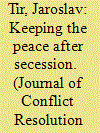

|
|
|
| 6 |
ID:
184200
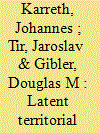

|
|
|
|
|
| Summary/Abstract |
Why do some democracies revert to non-democratic forms of governance? We develop an explanation of democratic reversals that emphasizes the influence of states’ external border relations on domestic politics. Latent threats to a state’s territory encourage political centralization of authority in the executive to defend against danger to the homeland. Latent territorial threat also facilitates the construction and maintenance of large land armies to fight threatening neighbors. Combined, latent territorial threat increases leaders’ domestic power, weakens democratic institutions, encourages other conditions threatening democratic survival, and, ultimately, leads to democratic reversals. Synthesizing prior research on territorial conflict, we generate a quantitative, continuous measure of latent territorial threat against all democracies with contiguous neighbors from 1946 to 2016, using Bayesian estimation. Empirical tests accounting for measurement uncertainty and other common determinants of reversals as well as brief reviews of individual cases of reversal provide robust evidence that democracy failed at higher rates in countries facing high levels of threats to their territory from neighbors. Our study implies that a complete account of the development of democratic institutions should emphasize that domestic factors alone fall short of explaining why democracies fail.
|
|
|
|
|
|
|
|
|
|
|
|
|
|
|
|
| 7 |
ID:
090914
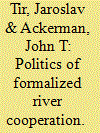

|
|
|
|
|
| Publication |
2009.
|
| Summary/Abstract |
While much of the extant literature has focused on the potential of international rivers to generate militarized conflict, this study builds on more recent works that examine the politics of river cooperation. The article focuses on the efforts to regulate the use of international rivers formally by the means of treaties. The theoretical framework incorporates prominent variables from the (neo)realist and neo-liberal schools of thought as well as the need for potable water and river-related geographic factors. The framework is used to generate expectations about whether riparian countries will enter into the treaties dealing in particular with the issues of water quantity and quality. Systematic empirical evaluations covering the entire world in the 1948-2000 time period confirm some while challenging much of the conventional wisdom on the topic. Specifically, preponderant power distribution, economic interdependence, democratic governance, and water scarcity all increase the chances for formalized river cooperation between contiguous riparian states. In contrast, the findings suggest that the roles of allegedly important and problematic factors such as the upstream/downstream relationship and recent militarized conflict have been exaggerated in earlier research. Cumulatively, the findings sound a cautiously optimistic note for the prospects of the spread of formal river cooperation in the less developed parts of the world.
|
|
|
|
|
|
|
|
|
|
|
|
|
|
|
|
| 8 |
ID:
110815
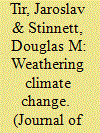

|
|
|
|
|
| Publication |
2012.
|
| Summary/Abstract |
Although the subject remains contested, some have speculated that climate change could jeopardize international security. Climate change is likely to alter the runoff of many rivers due to changes in precipitation patterns. At the same time, climate change will likely increase the demand for river water, due to more frequent droughts and greater stress being placed on other sources of water. The resulting strain on transboundary rivers could contribute to international tensions and increase the risk of military conflict. This study nevertheless notes that the propensity for conflicts over water to escalate depends on whether the river in question is governed by a formal agreement. More specifically, the article argues that the ability of river treaties to adapt to the increase in water stress resulting from climate change will depend on their institutional design. It focuses on four specific institutional features: provisions for joint monitoring, conflict resolution, treaty enforcement, and the delegation of authority to intergovernmental organizations. Treaties that contain more of these features are expected to better manage conflicts caused by water stress. This expectation is tested by analyzing historical data on water availability and the occurrence of militarized conflict between signatories of river treaties, 1950-2000. The empirical results reveal that water scarcity does increase the risk of military conflict, but that this risk is offset by institutionalized agreements. These results provide evidence, albeit indirect, that the presence of international institutions can be an important means of adapting to the security consequences of climate change by playing an intervening role between climate change and international conflict.
|
|
|
|
|
|
|
|
|
|
|
|
|
|
|
|
|
|
|
|
|